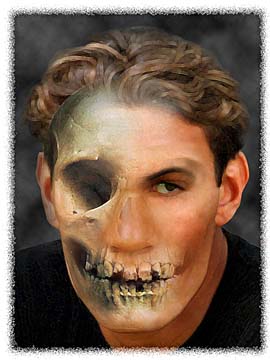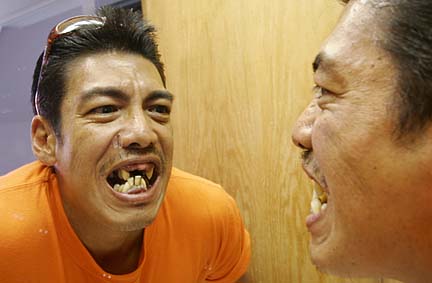
|
‘Meth mouth’ rises
Drug use promotes tooth decay and
dentists see a growing number of isle patients
whose teeth have rotted beyond repair
The toxic, acidic ingredients that make up crystal methamphetamine cause a condition known as "meth mouth," characterized by rampant tooth decay, gum disease and cracks in teeth.
Hawaii prisons are seeing many cases of rotting teeth caused by "ice" use, but dentists say it's a communitywide problem. They have teen patients with teeth destroyed by drug abuse.
"Some people, just so many teeth are invasively involved, all that's left is to extract them all and give them dentures," said Dr. John French at the Queen's Medical Center dental clinic.
"With the younger generation, especially in a state with no fluoride in the water, teeth are weak to begin with," he said. "It's a sad situation here. A lot of young people we're seeing are rapidly on their way to getting complete dentures."
The state Public Safety Department has no figures on prison dental costs but officials say dental problems have increased among inmates.
"Generally, Hawaii is in worse shape (than other states) because we have the worst dental hygiene in the country to begin with," said Wesley Mun, public safety health care administrator.
Dr. Susumu Tamanaha, a part-time dentist at Oahu Community Correctional Center, where inmates first are assessed, said a high percentage have bad teeth. "For the ones that are bad, it's really bad."
He said the prison doesn't keep statistics on whether inmates were ice users. Other issues also are involved, such as poor dental care and diet, he said. But when he started at OCCC 10 years ago, he rarely saw meth mouth, he said.
"Today, you see it every day. Teeth decayed all the way down to the gum line. Roots are still under the gums but everything above the gums is pretty well destroyed.
"It's a lifetime problem for them," Tamanaha said. "They don't realize that. By the time we see them, it's too late."
The only dental service offered at OCCC, since inmates are there a short time, is to remove the teeth, Tamanaha said. They can have dentures made at longer-term facilities but they must pay for them on a payment plan.
"It's pretty sad," Tamanaha said, noting they didn't feel any pain when they were doing drugs. "Now, it hurts them."
Dr. William Haning III, director of the Addiction Psychiatry Residency Program at the University of Hawaii John A. Burns School of Medicine, said drug abusers don't salivate, resulting in inability to maintain gum hygiene and resist gum infection.
Saliva washes away any dental contamination, like sugar, or foodstuffs that would contribute to bacterial growth or erode teeth, he said.
Drug abusers complain that their mouths get very dry but don't seem to care at the time that they have dental problems, he said.
Meth mouth isn't unique to methamphetamine users, noted Dr. Mark Greer, chief of the state Health Department's Dental Division.
He said it is a fairly common result of chronic drug abuse because of "decreased salivary flow, long binges of neglect, no hygiene and not eating properly.
"It sets the mouth up so you have this very aggressive form of tooth decay."
Dr. Russell Masunaga, who has the largest state contract to provide dentists for neighbor island correctional facilities, said, "It's not so much a problem in prison as a generalized community problem because of the scale of the ice epidemic."
He sees the condition as much in his practice outside the prisons as inside, he said.
Besides the loss of saliva, "lifestyle choices ice addicts make in terms of hygiene, nutrition, taking care of themselves, getting high and passing out, leads to rapid decay," he said.
Masunaga has seen aggressive decay in teens as young as 13 and 14, he said. "Their teeth are so far gone they need multiple root canal or extractions."
He said dentists try to address the issue with the child and parent. "Sometimes they don't come back because we start an intervention, so they pick another dentist."
French said he sees effects of drug use in the general population at the Queen's dental clinic, which treats poor and seriously ill patients.
"It's extremely variable as to how badly they've let mouths go but they can be very severe so essentially we're just dealing with roots of teeth and roots and teeth with fairly significant decay," he said.
Poor oral hygiene, high sugar, high-carbonate drinks and binging are part of the pattern of drug abuse, French said.
During his dental residency at the Queen's clinic, Dr. Randall Jenkins did research on the effects of crystal meth.
Addicts have a higher rate of cardiac problems with potential for stroke, vascular and psychological problems, Jenkins said. "We need to be aware of a high potential for them to be medically at-risk patients and a low potential for us to get that information from a patient.
"Basically what they call meth mouth is plain old neglect, the kind of lifestyle they're leading while using the drug," he said.
|

|
Years on ‘ice’
ruin man’s teeth
Rehabilitation helps a Hilo man regain
sobriety and get the dental help he needs
Nine of his upper teeth have been removed and seven on the bottom must go.
"I didn't realize because of meth they just deteriorated," said Casey Kunishige, 42, recovering at Hina Mauka from substance abuse.
"I've been going to the dentist every other week since I've been here and I'm having pain every day," he said. "They just took out the last two and I'm getting partial dentures."
Kunishige, of Hilo, said he began using crystal methamphetamine about 15 years ago and his dental problems began about three years later.
He tried to take care of his teeth, he said, "but no matter what I did, smoking just ate it (enamel) up."
Methamphetamine is made of toxic substances, such as fertilizer, lithium from batteries, lighter fluid, lye and hydrogen peroxide.
The highly acidic substances reduce a person's saliva, needed to neutralize acids and clean food from the teeth. The acids eat the tooth enamel and cause rampant tooth decay.
Kunishige said his mouth used to be real dry and he ate a lot of candy. "You crave chocolate."
He said he couldn't understand why his teeth were falling apart until he went to a dentist who said they all had to be replaced. He didn't have the money for that and continued doing drugs, he said.
He said a co-worker asked him to try crystal meth while they were on a construction job on Kauai. He continued using but always kept his job installing ceramic tile, he said. "I needed my income."

|
"My wife told me I need help, but at that time, I didn't think I had a problem until everything started to go downhill," he said.
He ended up at the Hawaii Community Correctional Center in August 2002 for terroristic threatening while on ice and carrying firearms in an unlocked case in his truck.
"When you're on meth you feel you need to be protected by some means," he said, explaining the illegal guns.
He underwent rehabilitation during 18 months in prison but went back to using meth when he was released in November on five years' probation, he said. "I wasn't ready to do treatment."
He lost his house and his wife and his three children began to grow distant because of his drug use, he said. "That's when I realized it's not what I want any more."
On Easter, he checked into a psychiatric ward in Hilo and two weeks later he was referred to Hina Mauka's residential treatment center in Honolulu.
"They gave me everything I needed, set me up for medical (coverage). It's amazing how the program works, how big a difference it made for me," he said.
He talks to his ex-wife and children by phone and they are proud of him, he said. "It's really an incentive to complete this."
He moved to a "clean and sober house" Wednesday and will continue classes at Hina Mauka as an outpatient for up to two years until he graduates from the program, he said.
He plans to seek work again in ceramic tile installation.
"I wish I didn't (do drugs), but I can't change what I've already done," he said. "I can only make things better."
E-mail to City Desk
[News] [Business] [Features] [Sports] [Editorial] [Do It Electric!]
[Classified Ads] [Search] [Subscribe] [Info] [Letter to Editor]
[Feedback]
